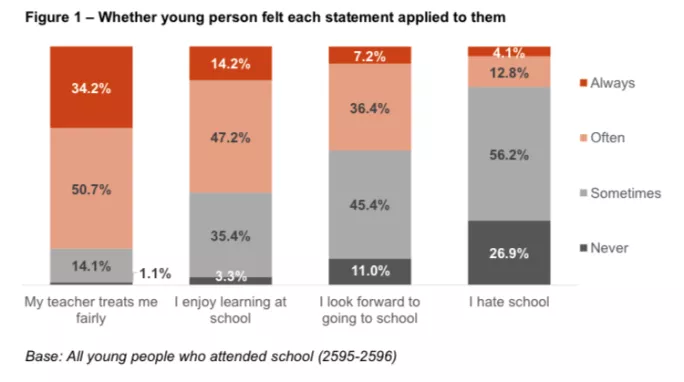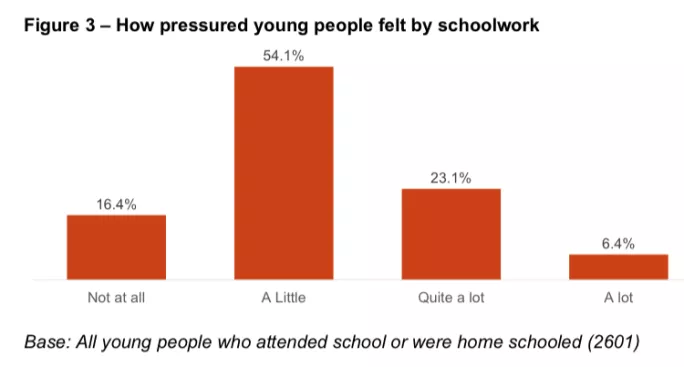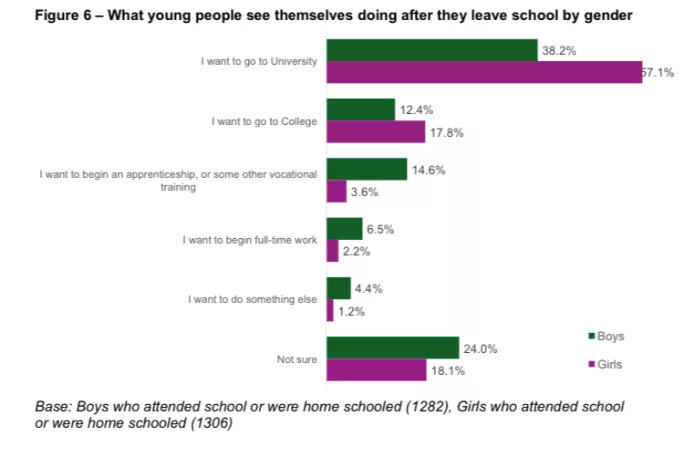One in five 14-year-olds has skipped school

A major study tracking the lives of thousands of Scottish children has found that one in five 14-year-olds reports truanting from school or skipping classes.
The research into the experiences of 14-year-olds also shows that roughly the same proportion say they are bullied at least once a week by being picked on, called names or made fun of - and half say they have experienced bullying.
However, overall, the research shows that the teenagers’ views on school are “largely positive” and that the vast majority believe their teachers treat them fairly.
- Other GUS findings: Extra nursery hours may not improve attainment
- Coronavirus: The scale of pupil Covid absence in Scotland revealed
- News: Persistent non-attendance is a key challenge facing schools
The findings are set out in the latest results from the Growing Up in Scotland (GUS) survey, which is tracking the lives of young people in Scotland from their early years and childhood into adolescence and beyond.
The latest GUS report, published yesterday, draws on data collected from 2,943 families in 2019-20, and was collected for the most part before the Covid pandemic, when the bulk of participants were aged 14 and in their third year of secondary school.
Concerns about school absence in Scotland
Some 19.6 per cent of 14-year-olds said they had skipped school or classes without their parent knowing, with girls more likely to play truant than boys (21.7 per cent compared with 17.7 per cent of boys). Young people in the most deprived postcodes were also more likely to say they had skipped school compared with those in the least deprived areas (24.2 per cent compared with 15.3 per cent).
Recently, in relation to the Scottish government’s ambition to narrow the disadvantage-related attainment gap, concerns were raised about Scottish pupils’ attendance at school.
Last week the University of Glasgow’s Professor Mel Ainscow told the Scottish Parliament’s Education, Children and Young People Committee: “One of the issues that really needs looking at is presence; attendance across Scotland prior to the pandemic is pretty awful. Now if the kids are not in school, how the hell are they going to participate and make progress? So I think there needs to be a push on attendance.”
Overall, the GUS report, entitled Life at 14, says “views on school were largely positive amongst young people”; 84.8 per cent said their teacher “always/often” treats them fairly and 61.3 per cent said they “always/often” enjoy learning at school.
Such enthusiasm was far from unanimous, however, and over half said they “sometimes” (45.4 per cent) or “never” (11 per cent) looked forward to going to school - but only a small minority (4.1 per cent) said they “always” hated school.

Nearly a third (29.5 per cent) of the 14-year-olds said they felt “quite a lot” or “a lot” of pressure because of schoolwork.

Looking to the future, 79.5 per cent of young people said they wanted to stay on at school or college full-time after S4. The most commonly chosen options for what they saw themselves doing when they left school were going to university (47.7 per cent) or college (15.1 per cent), although a substantial minority (21.1 per cent) were “not sure” (for boys that figure was 24 per cent).
Girls were far more likely than boys to say they wanted to go to university (57.1 per cent compared with 38.2 per cent). And young people from the least deprived areas were more likely to say they saw themselves going to university than those from the most deprived areas (57.5 per cent compared with 39.1 per cent).

Other key statistics from the GUS include:
- 4.8 per cent of 14-year-olds said they often or always misbehaved or caused trouble in class (54.3 per cent said they never misbehaved)
- 49.1 per cent said they had been bullied by being picked on, called names or made fun of (just under one in five - 18.4 per cent - were picked on in this way at least once a week)
- 47.2 per cent had been depressed for “several days or longer” (13.9 per cent said they has sought help for emotional or mental health difficulties)
- 17.1 per cent said they had hit, kicked or punched someone (but almost 70 per cent said they had not engaged in any of the anti-social behaviours listed, which also included damaging property, stealing and rowdy behaviour)
- 85.6 per cent said they spent at least one hour per day on an average school day watching videos, television programmes or films. A third (33.2 per cent) said they spend over three hours
- 37.2 per cent said they got less sleep than the recommended eight to 10 hours
- 32.9 per cent reported being physically active for the recommended seven hours or more a week
You need a Tes subscription to read this article
Subscribe now to read this article and get other subscriber-only content:
- Unlimited access to all Tes magazine content
- Exclusive subscriber-only stories
- Award-winning email newsletters
Already a subscriber? Log in
You need a subscription to read this article
Subscribe now to read this article and get other subscriber-only content, including:
- Unlimited access to all Tes magazine content
- Exclusive subscriber-only stories
- Award-winning email newsletters
topics in this article



